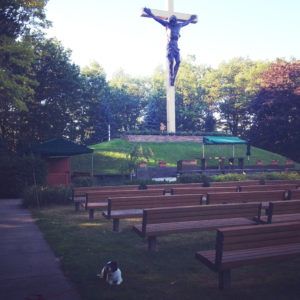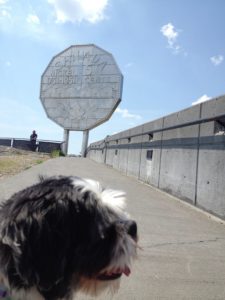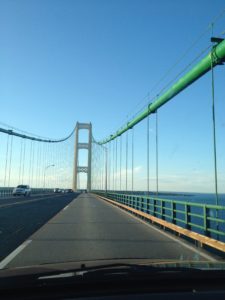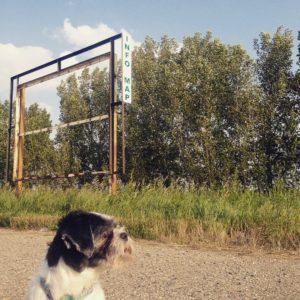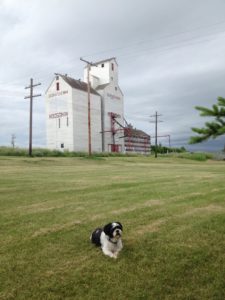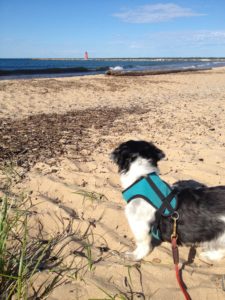At my church this past summer we explored the theme of ‘spiritual practices’ – in particular, practices that might be a bit unconventional. I found myself thinking about road trips, which is a bit odd since road trips and I have a somewhat checkered past. As a chronically carsick child, they were not my favourite thing, and certainly far from a spiritual practice. But when I got my driver’s license and my first car – an excellent Mercury Topaz that my cousin’s grandmother had put a whopping 40,000 km on in ten years – a whole new world opened up to me.
I discovered I loved driving long distances, that I don’t get tired when I drive, and that driving puts me in that ‘flow’ state that people sometimes talk about. I have taken road trips all across Canada and the United States, with friends, with family, and with my dog, Gizmo. Each one has been a chance to discover new places, take time to think, practice patience and be surprised. I really think you can’t do a road trip wrong (except maybe for the time my brother bent the frame of his car on a curb and had to abandon it in Quebec City – though that was probably its own learning experience.)
And of course, you can get lost. When I was in university, some friends and I decided to drive from Waterloo Ontario to Albany New York for a concert. This is a pretty long drive. When you factor in border crossing, it’s about seven hours each way. We were driving back very late at night after the concert, five of us packed into my friend Jared’s Topaz (‘90s student car theme here) and it was completely dark. My friend Joel asked Jared if we were heading in the right direction. Jared, very confidently, said, “Sure! We’re heading north, and Canada’s north. It’s fine!”
Of course this was before we had GPS capability in every pocket. At some point, we all grew a little suspicious of Jared’s route, as it seemed things were getting darker and more remote, and certainly not what we remembered from the ride there. Sure enough, we soon saw signs for the Canadian border… and Montreal. We had gone the wrong way around Lake Ontario, adding at least two or three hours to the trip. Jared cheerfully suggested we hunt down some Montreal bagels, but by that time it was about three a.m. and the rest of us thought it might be nice to head home.
I’m still not exactly sure if we were lost. This is the interesting thing to me about road trips. Every time I think I am lost, it seems to work out. At night, I have followed city lights back from the country. Sometimes a helpful stranger has given me directions. Once my GPS failed me in Sudbury, Ontario and I spent an hour on the phone with my dad while he used Google maps to help me find my way. Maybe we should reconsider what ‘lost’ means. We may not be where we had planned to go, but we can be fully present wherever we find ourselves. We can move in a new direction. We can humble ourselves to ask for help. A wonderful yoga teacher I know says that we should rest in uncertainty. So often our first instinct when we think we are lost is to panic and then try to solve the “problem”. But when we rest in the uncertainty of where we are, perhaps we gain more clarity about who we are and what we really need. Maybe, on some occasions, lost is where we are supposed to be.
Sometimes just when we think we will never get back on track, we find ourselves somewhere beautiful and unexpected. When I take road trips, I usually just pick a route and drive it. I generally know what my destination is, and always know what snacks I want to bring, but often I see incredible things along the way that I had no idea were there. One summer, I was driving home to Ontario and I decided to drive through the Upper Peninsula of Michigan. If any of you have ever taken the winding road along the north edge of Lake Michigan you will know how gorgeous it is. When I picked the route, I had no idea. And then I was suddenly at the Mackinac Bridge at sunset. Honestly, I had never heard of the Mackinac Bridge, and there it was, a magnificent 8 km long suspension bridge stretched out across the strait. I stopped to enjoy the view. C.S. Lewis talks about being “surprised by joy” and I have felt this way often when I suddenly encounter a new, beautiful place along the way.
An important spiritual practice for me when I am on a road trip is allowing myself to embrace surprises – and to stop and enjoy them. I love to take back-roads, drink local coffee, buy strawberries from farm stands. It helps me see things from a new perspective. It might be fast and efficient to take the freeway from A to B, but all you will likely encounter is another identical Tim Horton’s, and probably construction. I like the window into people’s lives that detours allow. I also know where to get great coffee in Helena, Montana, where to find ice cream in Bloomfield, Ontario and where to get the freshest lobster in North Rustico, PEI. For me the spiritual lesson is to stop, interact, take some time, and appreciate the beauty of the places we are blessed to pass through.
Of course, another thing we have to do a lot on long trips is re-fuel. I am a teacher, and, it turns out teaching is a job that takes a lot of energy, patience and emotional investment. For me, the best feeling in the world at the start of summer is to get in my car and set out across the prairie. When the big sky opens up in front of me, I feel my whole body relax. My ‘patience reservoir’ begins to refill – and I don’t mind admitting that some years it is nearly empty. Sometimes I will drive for several hours in silence, just basking in the quiet. In October, I drove by myself to visit a friend near Whistler, B.C., taking the Duffy Pass, which is the northern route into town. It was a slow, winding road through the mountains. There were many places on this mountain drive where there were no houses, no cars and no people, just mountains, sky and river valley. A great memory from that drive was when I stopped on a ridge, got out of the car and sang at the top of my lungs. Encountering silence and beauty and allowing them to fill us and renew us can be an essential component of spiritual practice.
But what if we have to turn around and go back? The Bible tells us in the second chapter of Luke about Jesus’ family heading home from an annual trip to Jerusalem for Passover. They were a full day’s walk into the homeward trip before they realized that 12-year-old Jesus wasn’t with them. I’m sure they were frantic as they returned to Jerusalem, especially as it took them several days to find him. And you can just picture the pre-teen eye roll when Jesus tells his mother that of course he’d be in the temple (sigh). Life isn’t a one-way trip. Going back doesn’t mean you’re doing something wrong. Maybe you are looking for something you lost, or something you haven’t found yet. Maybe you need to retrace your steps, or maybe take a slightly different route.
At one point in my life I had to commute an hour each way through rural Saskatchewan, and every day was interesting. Sometimes it was scary, a ride through drifting snow; sometimes breathtaking, frosty fields at sunrise; sometimes hilarious, my little Honda Civic completely coated in mud like a Jeep commercial. But it was always just a little different. You don’t have to go a long way to go on an adventure. It’s all about paying attention to the details along the way. Carpooling with my coworkers also made that rural commute more enjoyable. We sang along to the radio, or talked about life, or helped push cars that had gotten stuck in snow banks. Sometimes it’s nice to have good company along the way.
In his largely autobiographical classic On the Road, Jack Kerouac and his friend Dean take up an offer to drive a 1947 Cadillac from Denver to Chicago for a travel bureau. Kerouac writes about driving through Nebraska one night:
A hundred and ten miles an hour straight through, an arrow road, sleeping towns, no traffic, and the Union Pacific streamliner falling behind us in the moonlight. I wasn’t frightened at all that night; it was perfectly legitimate to go 110 and talk and have all the Nebraska towns – Ogallala, Gothenburg, Kearny, Grand Island, Columbus – unreel with dreamlike rapidity as we roared ahead and talked. It was a magnificent car; it could hold the road like a boat holds on water. Gradual turns were its singing ease. “Ah man, what a dreamboat,” sighed Dean. “Think if you and I had a car like this one what we could do. Do you know there’s a road that goes down Mexico and all the way to Panama? -and maybe all the way to the bottom of South America…man, the road must eventually lead to the whole world. Ain’t nowhere else it can go—right?1
The road must eventually lead to the whole world.
Trust that you’re on the right road. Stop and look at the sights. Breathe in the silences. Talk for hours. Sing at the top of your lungs. Ditch the tent and sleep in a hotel. Remember that you aren’t lost. Turn the car around if you need to, and go sleep in your own bed. The road will still be there in the morning, ready to take you where you need to be.
All photos courtesy of Emily Schaming
- Kerouac, Jack. (1959). On the Road. U.S.: Penguin Books, Viking Compass Edition. Part III; Ch. 9; pg. 231.


